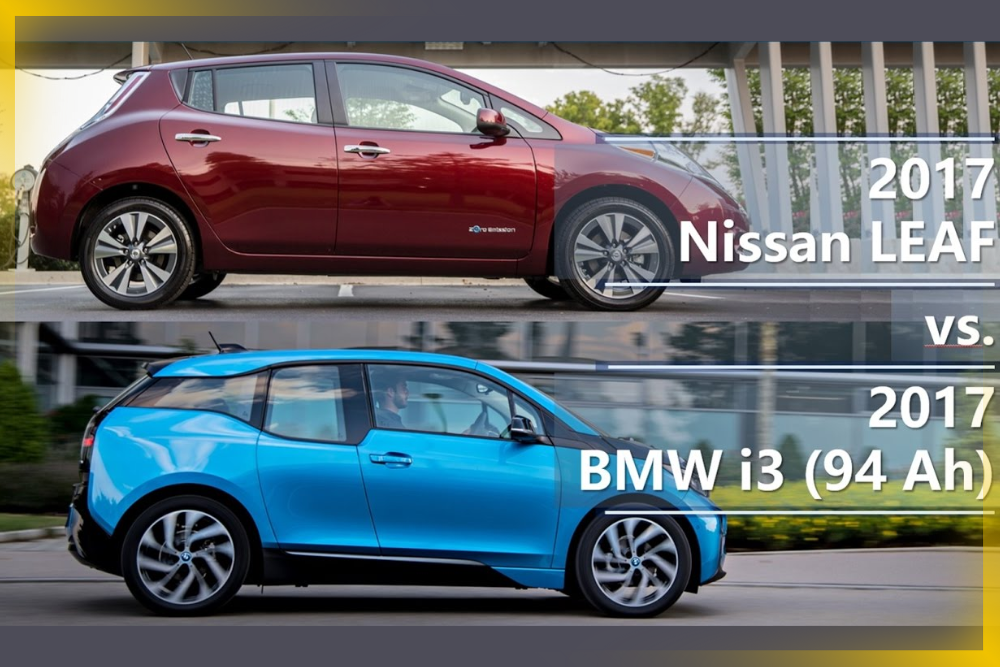Electric vehicles are not the advanced idea they used to be; they are the present and fate of driving. The most famous electric vehicles (EVs) are the BMW i3 and the Nissan Leaf. The two vehicles have cut out an interesting specialty to ecologically cognizant drivers who value development and execution. However, which of these two is better? How about we plunge deeply into the subtleties to find out?
Design and Aesthetics
The BMW i3 stands apart with its strong, advanced plan, highlighting remarkable square-shaped shapes and restricting mentor entryways. It offers a rich, moderate inside with maintainable materials like wood and reused plastics. Then again, the Nissan Leaf has a more conventional hatchback plan with a smooth, streamlined look and a practical, agreeable inside.
Exterior Design
The BMW i3 stands out because of its unique, modern look. It looks very modern with its small, boxy shape. Beautiful coach doors on either side make getting to the back seats easy. The Nissan Leaf, on the other hand, looks like a normal hatchback. It’s easier to get than the i3 because of its slim profile, aerodynamic design, and lack of debate.
Interior Design
Inside, the BMW i3 feels like a parlor. It’s moderate yet rich, with materials like reasonable wood and reused plastics. The i3’s open and breezy lodge gives a feeling of room. Alternately, the Nissan Leaf centers around common sense. Its inside is practical, with agreeable seats and a natural format. However, it could come up short on the premium feel of the i3.
Build Quality
With regards to construct quality, BMW has a slight edge. The i3 feels strong and professional, befitting its superior image status. While all-around fabricated, the Leaf utilizes more ordinary materials that may not feel as upscale as those in the i3.
Performance and Driving Experience
The BMW i3 conveys deft and responsive execution with its electric engine, giving around 170 drive to energetic speed increase. Its lightweight development and back tire drive give deft dealing with and a reasonable ride. Interestingly, the Nissan Leaf offers a smooth driving involvement in choices like the Leaf Furthermore, which gives improved power and a more drawn-out range, making it ideal for regular driving.
Engine Specifications
The BMW i3 is fueled by an electric engine that conveys around 170 pull, giving a zippy and responsive drive. Its 147-pull electric engine in the standard form and 214 strength in the Leaf Besides offer a smooth and skilled driving experience.
Acceleration and Speed
The i3’s lightweight development and back tire drive format cause it to feel lithe and fast off the line. It can advance rapidly from 0 to 60 mph in around 7 seconds. While somewhat slower in the standard model, the Nissan Leaf coordinates well with the Leaf addition, which offers comparable speed increase times.
Handling and Ride Comfort
The BMW i3 succeeds in taking care of gratitude to its low focal point of gravity and adjusted weight circulation. It feels deft in city traffic and stable on the roadway. The Nissan Leaf is more about solace, with a suspension arrangement that smooths out harsh streets yet may not be as drawn in to drive as the i3.
Range and Battery Life of BMW i3
The BMW i3 has a 42.2 kWh battery, offering a fair reach for city drives. The Nissan Leaf gives two choices: a 40 kWh battery in the standard model and a 62 kWh battery in the Leaf. Furthermore, it takes special care of those requiring more reach. The BMW i3 conveys around 153 miles at full charge in genuine circumstances. The standard Nissan Leaf offers around 150 miles, while the Leaf stretches out this to roughly 226 miles, making it a superior choice for those with longer drives. The two vehicles can be charged at home or public charging stations. The BMW i3 requires around 6 hours to charge on a Level 2 charger, though the standard Leaf requires around 8 hours. With its bigger battery, the Leaf Furthermore expects around 11.5 hours for a full charge; however, it upholds quicker DC charging, adding huge reach in around 30 minutes.
Technology and Driver Assistance Features
The BMW i3 accompanies the iDrive infotainment framework, which is known for its convenience and great presentation. It incorporates route, Bluetooth, and cell phone reconciliation. The Nissan Leaf’s framework is clear and easy to understand, with comparable highlights yet not generally so clean as BMW’s. The two vehicles offer availability choices, including Apple CarPlay and Android Auto. The BMW i3’s framework feels more coordinated and consistent, while the Leaf’s is common and successful. Wellbeing and accommodation highlights are ample in the two vehicles. The BMW i3 incorporates versatile journey control, stopping, and driver help innovations. The Nissan Leaf coordinates with ProPILOT Help, which offers semi-independent driving capacities.
Safety Features
Security is vital for both BMW and Nissan. The i3 and Leaf have different standard security highlights, including various airbags, strength control, and electronically monitored slowing mechanisms. The two vehicles have performed well in crash tests. The BMW i3 has acquired good grades from the IIHS, while the Nissan Leaf has gotten comparative honors, settling on them both safe driver decisions. High-level well-being advances, such as programmed crisis slowing down, path takeoff advance notice, and vulnerable side checking, are accessible on the two models, upgrading driver certainty and security out and about.
Environmental Impact
As electric vehicles, the i3 and Leaf produce zero tailpipe discharges, adding to cleaner air and diminished carbon impressions. BMW has gone further with reasonable materials in the i3’s development. Both BMW and Nissan have projects to reuse batteries and different parts, guaranteeing their vehicles have a negligible ecological effect throughout their lifecycle. Generally speaking, the ecological impression of the two vehicles is excellent. The BMW i3’s utilization of sustainable materials and energy-effective creation processes marginally edge out the Leaf.
Running Cost and Resale Value
The BMW i3, being a top-notch vehicle, accompanies a more exorbitant cost tag than the Nissan Leaf. Notwithstanding, different motivations and discounts can assist with diminishing the compelling expense of the two vehicles. Electric vehicles, for the most part, have lower running expenses than fuel vehicles. The i3 and Leaf are no special cases, with low power costs, negligible upkeep, and duty impetuses adding to their allure. The BMW i3 is worth better than the Nissan Leaf because of its top-notch brand and fabricated quality. Notwithstanding, the Leaf’s lower starting expense and more extensive accessibility make it a solid competitor in the trade-in vehicle market.
Routine Maintenance and Warranty
Both the i3 and Leaf require insignificant support contrasted with conventional vehicles. Routine checks, tire pivots, and infrequent programming refreshes are the standard. The Nissan Leaf has areas of strength for a record of dependability, with less detailed issues throughout the long term. The BMW i3, while solid, may have higher support costs because of its more mind-boggling frameworks. The two vehicles accompany exhaustive guarantees that cover the battery and significant parts for a long time, giving proprietors true serenity.
Cabin/Cargo Space and Comfort Features
The BMW i3, despite its smaller size, offers adequate lodge space for four grown-ups thanks to its creative plan. With its bigger impression, the Nissan Leaf gives more back-seat space and better solace. The Nissan Leaf wins in freight space, offering more space for baggage and food. The BMW i3’s more modest trunk is sufficient for city use, yet it might be restricted to bigger burdens. The two vehicles have different solace highlights, including environment control, warmed seats, and great sound frameworks, guaranteeing a wonderful driving encounter.
Pros and Cons
Advantages of BMW i3
- Unique, futuristic design
- High-quality, sustainable materials
- Agile handling and performance
Disadvantages of BMW i3
- Higher purchase price
- Limited cargo space
- Shorter range compared to Leaf Plus
Advantages of Nissan Leaf
- Practical and familiar design
- More affordable
- Longer range with Leaf Plus
Disadvantages of Nissan Leaf
- Less premium feel
- Slower acceleration in the standard model
- Conventional materials and design
Who Should Buy Which?
The BMW i3 is perfect for urban dwellers who value design, performance, and sustainability. It’s ideal for those paying a premium for a unique, high-quality vehicle. The Nissan Leaf is suited for practical buyers looking for an affordable, reliable, and efficient electric car. It’s great for families and those with longer commutes.
Use Case Scenarios
BMW i3: City driving, short commutes, premium experience
Nissan Leaf: Daily commuting, family use, cost-conscious buyers
Frequently Asked Questions (FAQs)
The BMW i3 and Nissan Leaf have complete guarantees covering the battery and significant parts for quite some time. BMW offers a 4-year/50,000-mile guarantee, while Nissan gives a 3-year/36,000-mile guarantee, with extra inclusion for the battery.
The Nissan Leaf, especially the Leaf Additionally, is more qualified for really long travel because of its more extended territory and greater charging organization. The BMW i3 is great for more limited drives and city driving.
Yes, the BMW i3 and Nissan Leaf fit the bill for government tax breaks and different state motivators for electric vehicles. The accessibility and measure of these motivators can shift, so checking current projects in your area is ideal.
Conclusion
The decision in the BMW i3 versus Nissan Leaf fight reduces to what you esteem most. If you’re searching for a premium, creative, and extraordinarily styled vehicle, the BMW i3 is your smartest choice. Be that as it may, if reasonableness, moderateness, and a more drawn-out range are your needs, the Nissan Leaf sticks out. The two vehicles have qualities and are amazing options in the developing electric vehicle market.

